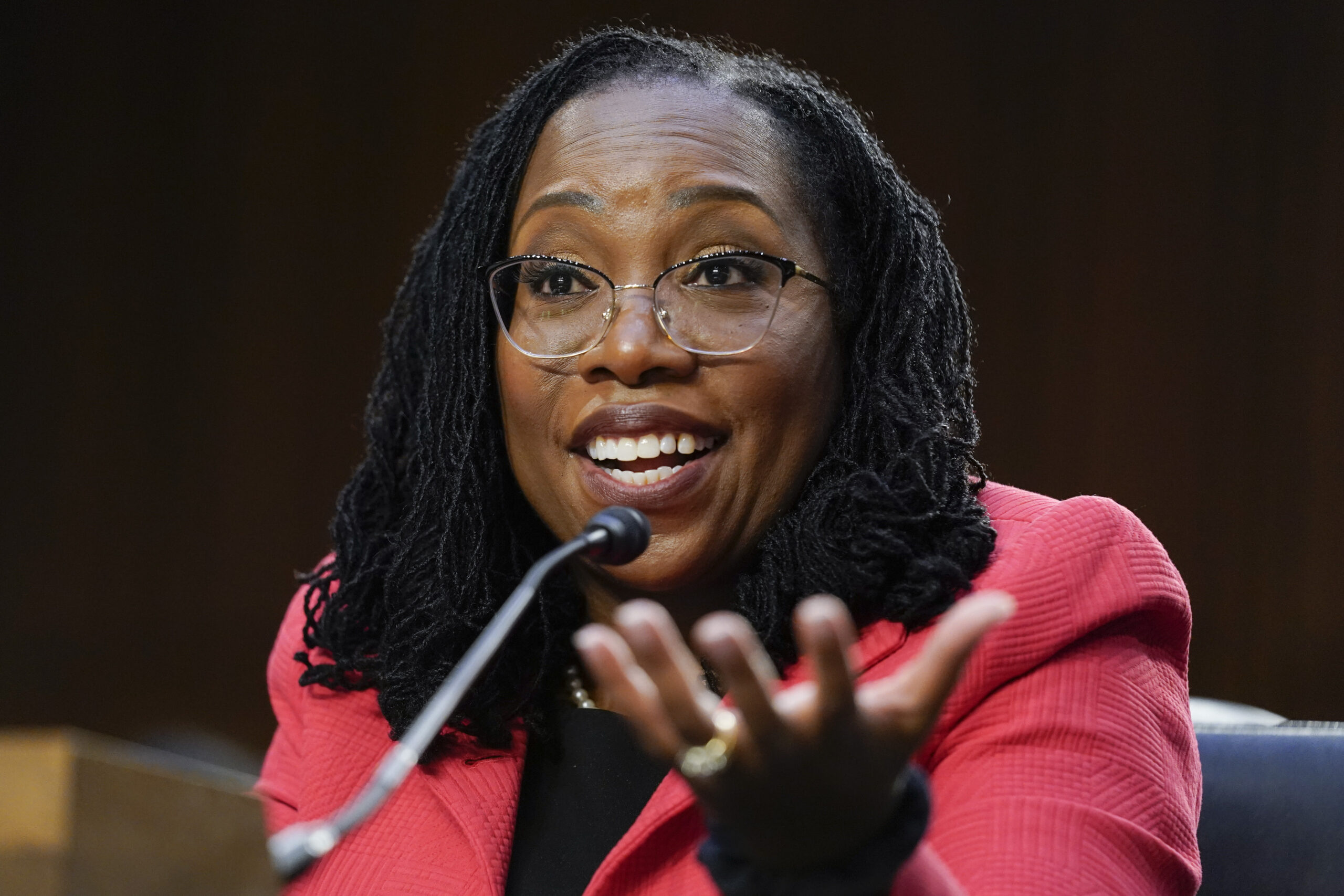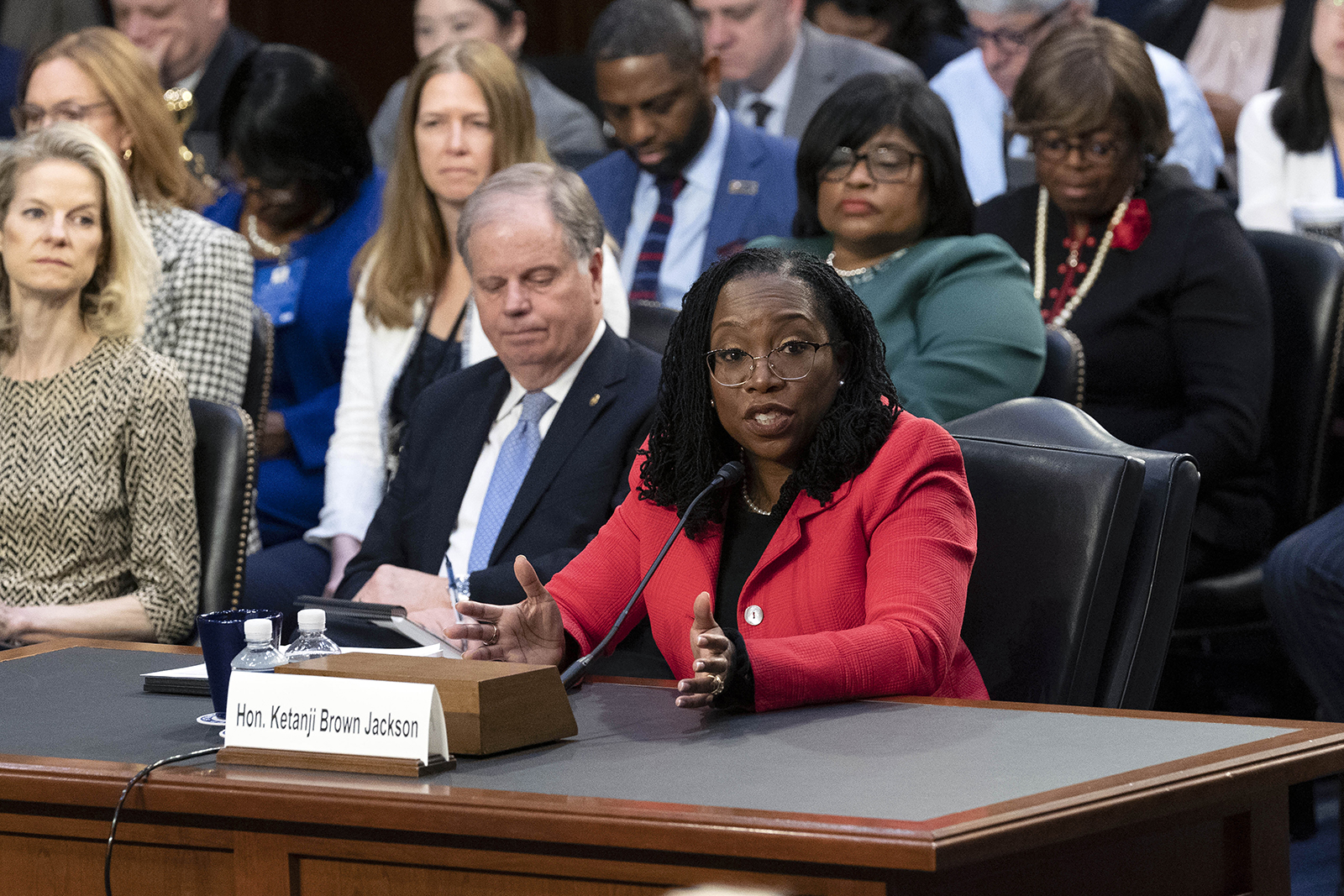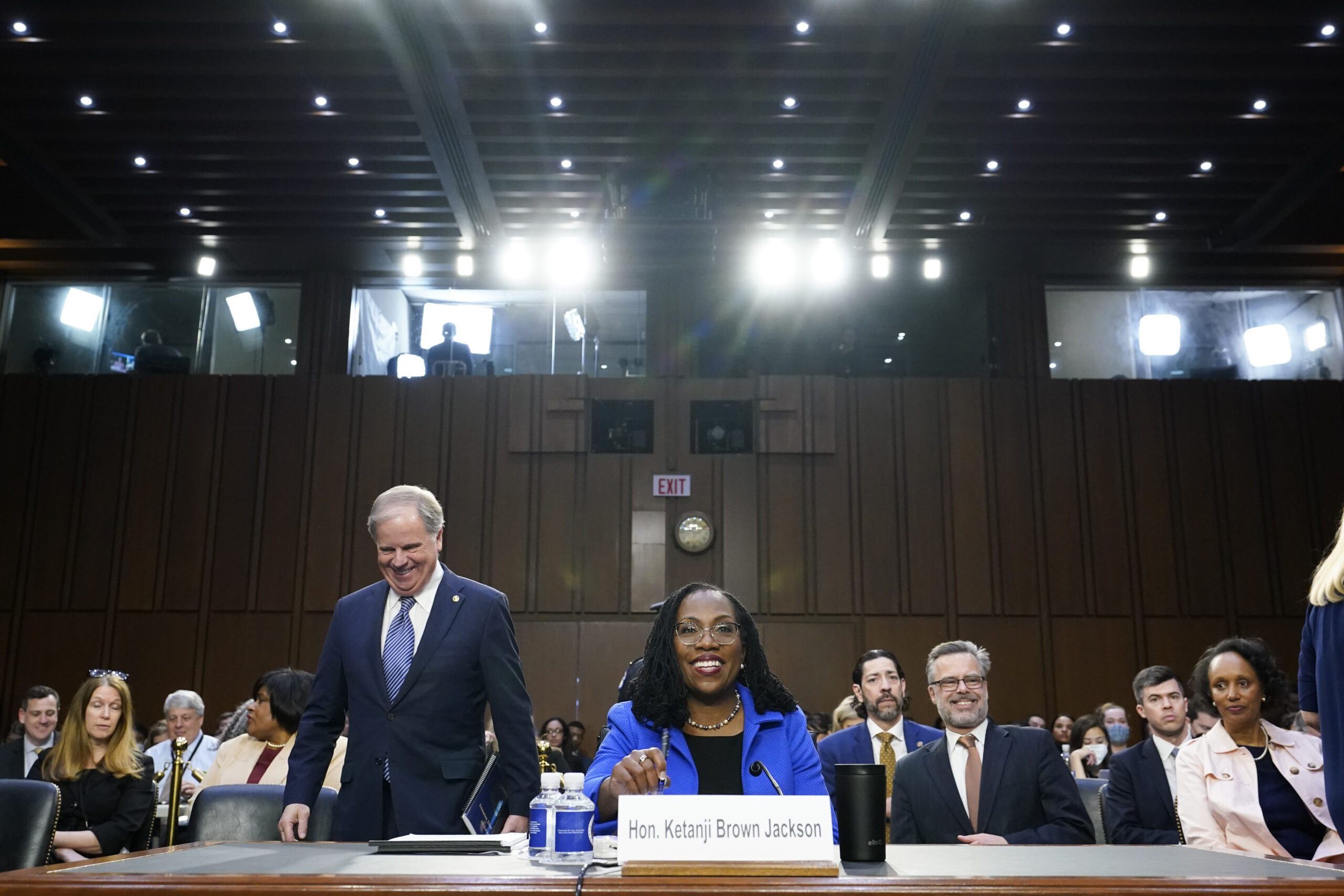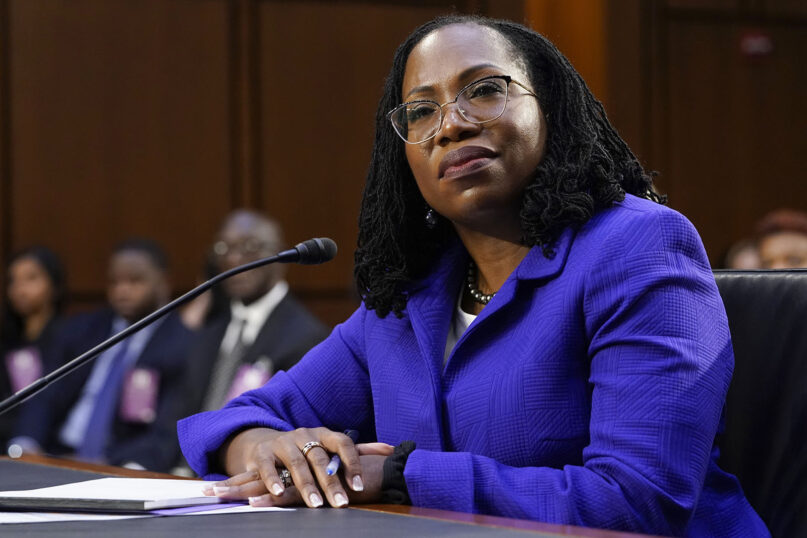(RNS) — Nearly every African American Protestant, nondenominational or denominational, is familiar with the Charles Wesley hymn, “A Charge to Keep I Have.” My double charge this week, as an African American Baptist woman who was both inspired and outraged by the Senate Judiciary Committee hearings for Supreme Court nominee Ketanji Brown Jackson, is to be a prayer warrior and an anger translator as her confirmation hangs in the balance.
Like many Americans, I was infuriated by the abusive treatment Judge Jackson received even as I admired the persevering, calm discipline that she displayed. Most of us, if social media is any indication, could not have managed what she did. One post, from zombywoof68, that was circulated by many African American women pictured Jackson sitting calmly and staring pleasantly, and prayed simply, “For overqualified women who have to remain calm, friendly, knowledgeable, and professional in front of underqualified men … Lord, in your mercy, hear our prayer.”
I experienced what W.E.B. Du Bois identified as “two warring souls in (my) one dark body”: the warrior souls of a sociologist and a Baptist minister. I shouted at the television while simultaneously petitioning God to strengthen Jackson to stand fast and emerge victorious in the face of abusive verbal violence from powerful white men. For the two days of televised hearings, I conversed with colleagues and friends by phone and Facebook, all of us praying and cussing during Jackson’s “trial by ordeal.”
We cheered and applauded the rich teaching Jackson provided in her answers to questions that ranged from the substantive and helpful to the hostile, deceptive and downright abusive.
RELATED: Ketanji Brown Jackson publicly expresses thanks to God but keeps faith history private
So many of the questions Jackson answered with specifics about what judges and other federal legal minds actually do. The better questions gave us insight into what it takes to think like a lawyer, to write like a lawyer and to argue on behalf of someone, whether or not one agrees with that client. If confirmed, Jackson may be the only justice with experience at so many diverse levels of the judiciary.

Supreme Court nominee Ketanji Brown Jackson testifies during her Senate Judiciary Committee confirmation hearing on Capitol Hill in Washington, March 22, 2022. (AP Photo/Andrew Harnik)
I appreciated Jackson’s obvious empathy for the Founding Fathers’ vision as she discussed their antagonism toward monarchy and how they created the “horizontal” and “vertical” politics of our republic. She illuminated the living logic in Articles I, II and III, which define the roles of the legislative, executive and judicial branches of our government.
Her loving admiration for the Constitution and the nation shone through as she described her work and the bundles of tasks — tasks many of us wouldn’t associate with judging — necessary to reach any judicial decision. Even the personal details of her family and education provided illuminating and teachable connections to the American experience.
Sen. Richard Blumenthal, a Connecticut Democrat, pointed out that Jackson had issued more opinions — 573 — in her nine years on the federal bench than the entire Supreme Court in the same period. She offered opinions involving Guam that touched on environmental issues. She addressed intellectual property in a case where she distinguished between a “religious” and “cultural” group.
Despite my familiarity with the Constitution, I learned that even a menu and recipes are intellectual property; I will approach my next restaurant visit with new eyes. I realized how often I had glossed over the Ninth Amendment. I and now the whole nation knows about unenumerated rights in language that nonlawyers can understand.

Sen. Lindsey Graham, R-S.C., a former chairman of the Senate Judiciary Committee, questions Supreme Court nominee Ketanji Brown Jackson during her confirmation hearing, on Capitol Hill in Washington, March 22, 2022. (AP Photo/J. Scott Applewhite)
Even when she refused to “opine,” we learned about issues she could face if she is confirmed. Responding to Sen. Lindsey Graham’s intrusive and inappropriate questions about religion, Jackson, answering “Protestant” and “nondenominational,” credibly defended the principle of keeping personal faith separate from public roles. We were witnessing a major moment in American history with an African American woman at the very center.
At the same time, the politics of hate were on full display. I also learned in this process that hearings for Supreme Court nominees began in 1916, when President Woodrow Wilson, a segregationist president who enabled the resurgence of the Ku Klux Klan by supporting the film “Birth of a Nation,” nonetheless nominated the first Jewish justice, Louis Brandeis. The antisemitic outcry was so great, according to historian Michael Beschloss, that the Senate held its deliberations in public.
The tradition of these hearings itself, then, was born in the politics of hate, and Jackson’s hearings served as an enabler for those politics.
I was also appalled, sickened and angered by the thuggish obsession with child pornography displayed by some of the senators most vehemently opposed to her nomination. Sen. Josh Hawley’s particularly lurid descriptions of the pictures told us how much vigorous attention to detail he had paid to the filth in question.

Supreme Court nominee Ketanji Brown Jackson speaks before the Senate Judiciary Committee as she attends the second day of her confirmation hearing, on Capitol Hill, March 22, 2022, in Washington. ( AP Photo/Jose Luis Magana)
These senators repeatedly forced Judge Jackson to revisit these monstrous and painful cases, demanding that she explain sentence fragments and, they hoped, apologize for and retract misrepresented and cherry-picked phrases from her sentencing documents. They loudly and derisively interrupted her and over-talked her, demanded that she change her answers to the same question. It was abusive warfare, plain and simple.
The most relentless senators demanded to see sealed court records, with the power to re-victimize the child victims the senators purported to protect. Even with redactions, the redactors would violate the victims’ privacy and identities, and be victimized themselves by their exposure to the toxic evidence. All in order to destroy Judge Jackson. Hate so deeply informed their mission that they dismissed the possible collateral damage.
In response, Jackson continued teaching about confronting humanity at its worst, how she viewed every bit of evidence in every case, listening to and weighing its impact on victims. She described the multiple voices involved in conviction and sentencing. She repeatedly pointed out that she was required to view and weigh all of this evidence. She repeatedly described the impact of this material on victims, repeatedly distinguished between the different types of discourses embedded in her sentencing statements.
She repeatedly distinguished between her work as a member of the sentencing commission and her work as a sentencing judge. She described how she, in her courtroom, communicated the importance of “accountability” to convicted criminals.
Jackson repeatedly invoked her consciousness as a mother of daughters. She repeatedly described how some things still returned to her in nightmares.
Regardless, Jackson’s detractors insisted upon misreading a stray colloquialism embedded in some of her sentencing statements, “I’m sorry, but. . . ,” as apologizing to criminals. Black women who are mothers or who were ably mothered recognize the rhetorical device as the opening salvo in a serious moral tongue lashing.

Supreme Court nominee Ketanji Brown Jackson returns from a break in her Senate Judiciary Committee confirmation hearing on Capitol Hill in Washington, March 23, 2022. Former Sen. Doug Jones, D-Ala., is at center left. (AP Photo/Alex Brandon)
RELATED: At Jackson hearings, ‘What is your faith?’ becomes a gotcha question
When Jackson told the story of the angel (my term) who stopped her on a Cambridge, Massachusetts, street when she was a cold, lonely undergraduate and whispered, “Persevere,” I felt my tears come. African American history is replete with examples of the kind of viciousness the senators aimed at this Black woman. The gender stereotypes wielded against us have taught us to act “in defense of ourselves,” as we persevere in unwelcoming spaces.
In her 1892 book, “A Voice From the South,” educator and theologian Anna Julia Cooper famously observed, “Only the Black Woman can say when and where I enter in the quiet undisputed dignity of my womanhood without violence and without suing or special patronage, then and there the whole Negro race enters with me.”
The verbal violence displayed by some of the most powerful white men in America let the whole world know that such a day of undisputed dignity has not come. Until that day comes, Ketanji Brown Jackson needs to know that she has an army of prayer warriors and anger translators ready to help her as she continues “to act justly, to love mercy, and to walk humbly. … ”

Cheryl Townsend Gilkes. Courtesy photo
(Cheryl Townsend Gilkes is the John D. and Catherine T. MacArthur Professor of African American Studies and Sociology at Colby College; assistant pastor for special projects at Union Baptist Church in Cambridge, Massachusetts; and author of “If It Wasn’t for the Women: Black Women’s Experience and Womanist Culture in Church and Community.” The views expressed in this commentary do not necessarily reflect those of Religion News Service.)





